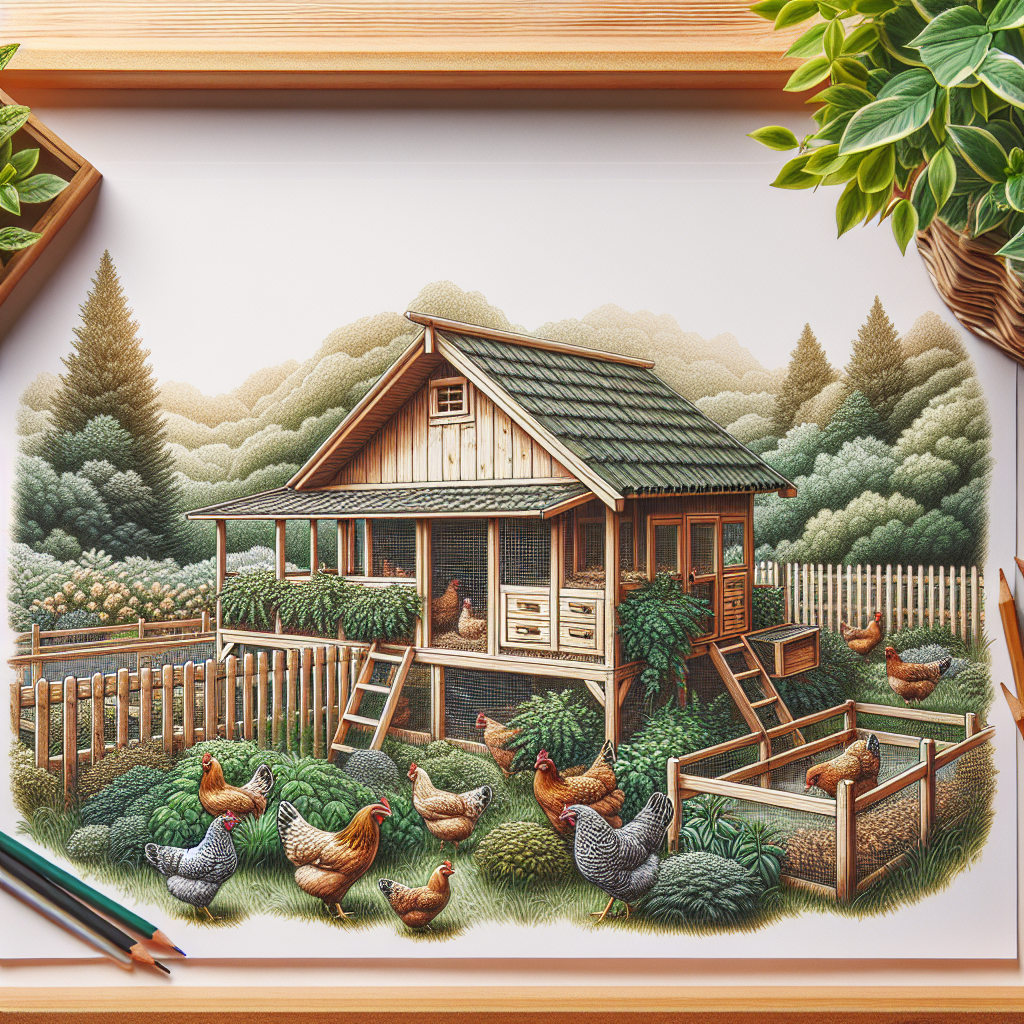In this article, we will explore the importance of identifying and addressing potential environmental stressors for your flock. As you care for your feathered friends, it’s essential to understand the various factors that can impact their well-being. By being aware of and taking steps to mitigate these stressors, you can ensure a healthier and happier environment for your flock. Let’s dive in and discover effective strategies to keep your birds thriving!
Understanding Environmental Stressors
Environmental stressors refer to any factors in the environment that can cause discomfort or negative effects on the well-being of poultry. These stressors can impact the birds’ health, productivity, and overall performance. It is essential for poultry farmers to understand and address these stressors to ensure optimal conditions for their flock.
Defining Environmental Stressors
Environmental stressors can be categorized into various factors, including physical, biological, and social stressors. Physical stressors can include extreme temperatures, poor ventilation, inadequate space, and excessive noise levels. Biological stressors may involve pathogens, parasites, or other infectious agents. Social stressors can arise from overcrowding or aggressive interactions within the flock. Identifying and addressing these stressors is crucial to maintaining the health and well-being of the poultry.
Common Environmental Stressors for Poultry
Poultry are particularly susceptible to certain environmental stressors. Some common stressors for poultry include high or low ambient temperatures, inadequate or inconsistent ventilation, overcrowding, excessive noise levels, poor lighting conditions, and unsuitable litter quality. These stressors can have a significant impact on the birds’ health and productivity if not properly managed.
Identifying Environmental Stressors
To effectively address environmental stressors, it is important to first identify them. There are several methods that can help poultry farmers determine the stressors affecting their flock.
Observation of Flock Behavior
Regular observation of the flock’s behavior can provide valuable insights into potential stressors. Pay attention to any signs of abnormal behaviors, such as excessive pecking, aggression, or feather picking. Also, observe the birds’ feeding and drinking patterns, as changes in appetite or water consumption can indicate underlying stress.
Regular Health Assessments
Performing regular health assessments is essential for identifying any health issues that may be caused or exacerbated by environmental stressors. These assessments can include physical examinations, blood tests, and fecal sampling. By monitoring the overall health of the flock, farmers can detect any signs of stress or illness early on.
Environmental Assessments
Conducting regular assessments of the poultry housing and environment is crucial for identifying potential stressors. Assess the housing conditions, including temperature, ventilation, lighting, and litter quality. Evaluate the overall cleanliness and hygiene of the environment, as poor sanitation can contribute to stress and disease. These assessments will help determine areas that need improvement to mitigate stressors.
Common Signs of Environmental Stress
Recognizing the signs of environmental stress is vital for addressing them promptly and effectively. The following are some common signs that indicate the presence of environmental stressors in poultry:
Reduced Feed Consumption
Stress can lead to a decrease in the birds’ appetite, resulting in reduced feed consumption. If you notice a significant decrease in feed intake, it could be a sign of environmental stressors affecting your flock.
Decreased Egg Production
Environmental stressors can have a direct impact on egg-laying performance. A sudden decrease in egg production or poor egg quality might indicate the presence of stressors that need to be addressed.
Abnormal Behavior
Stress can manifest in various abnormal behaviors among poultry. This can include increased aggression, feather pecking, reduced social interactions, or even abnormal vocalizations. If you observe any of these behaviors, it is essential to investigate and address the underlying stressors.
Addressing Environmental Stressors
Once environmental stressors are identified, it is crucial to take appropriate measures to address them effectively. Here are some key strategies for addressing environmental stressors in poultry:
Optimizing Housing Conditions
Ensure that the poultry housing provides a comfortable and suitable environment for the birds. This includes maintaining proper temperature and humidity levels, sufficient ventilation, adequate lighting, and appropriate litter quality. Regular cleaning and disinfection of the housing area are also essential to prevent the buildup of pathogens and maintain good hygiene.
Managing Temperature and Ventilation
Proper temperature and ventilation management are crucial for preventing heat or cold stress in poultry. Monitor and maintain the optimal temperature range for the birds’ age and stage of production. Utilize appropriate heating or cooling systems to regulate temperature, and ensure adequate ventilation to remove moisture and maintain fresh air supply.
Providing Sufficient Space
Overcrowding can contribute to stress and conflicts within the flock. Ensure that the birds have sufficient space to move, feed, and express their natural behaviors. Adequate space allocation can help minimize stress and aggression among poultry.
Controlling Noise Levels
Excessive noise can be a significant stressor for poultry. Minimize loud noises or sudden sounds that can startle or disturb the birds. Consider installing sound-absorbing materials or using noise reduction techniques to create a quieter environment for the flock.
Ensuring Proper Ventilation
Proper ventilation plays a vital role in maintaining a healthy and stress-free environment for poultry. When ventilation is inadequate, the accumulation of moisture, ammonia, and airborne pathogens can negatively impact the birds’ respiratory health and overall well-being.
Understanding Ventilation Importance
Ventilation helps remove excess moisture, gases, and airborne contaminants from the poultry housing. It also ensures the supply of fresh air, which is essential for the birds’ respiratory health. Proper ventilation prevents the accumulation of harmful substances and helps regulate temperature and humidity levels, reducing stress on the birds.
Assessing and Improving Ventilation Systems
Regularly assess the ventilation systems to ensure they are functioning optimally. Check for any obstructions, blockages, or malfunctioning equipment. Make necessary adjustments or repairs to improve air circulation and maintain sufficient ventilation. Periodically clean or replace air filters and regularly monitor airflow and air quality to detect any potential issues.
Managing Temperature
Temperature management is crucial for preventing heat or cold stress in poultry. Maintaining the optimal temperature range for the birds’ age and stage of production is essential for their well-being and performance.
Maintaining Optimal Temperature Range
Monitor and maintain the appropriate temperature range inside the poultry housing. Different bird species and ages have specific temperature requirements, so it is necessary to adjust accordingly. Regularly monitor temperature levels using thermometers and make adjustments as needed to ensure the birds are comfortable.
Using Heating and Cooling Systems
During extreme weather conditions, heating or cooling systems can help maintain a comfortable temperature for the birds. Utilize heaters or fans to regulate the temperature as necessary. Ensure that the heating or cooling equipment is properly installed, maintained, and monitored to avoid any potential hazards.
Providing Adequate Shade
When raising poultry outdoors, provide adequate shade to protect the birds from direct sunlight and extreme heat. This can include natural shade from trees or artificial structures like shades or awnings. Adequate shade helps prevent heat stress and promotes a more comfortable environment for the poultry.
Maintaining Good Hygiene
Good hygiene practices are crucial for reducing the risk of environmental stressors and disease outbreaks in poultry. Maintaining a clean and sanitary environment is essential for the birds’ health and well-being.
Effective Cleaning and Disinfection
Regularly clean and disinfect the poultry housing, equipment, and surroundings. Remove any accumulated manure, litter, or spilled feed to prevent the buildup of harmful pathogens or pests. Use appropriate disinfectants and follow recommended protocols to ensure thorough cleaning and disinfection.
Avoiding Overcrowding
Overcrowding can contribute to stress, poor air quality, and the spread of diseases among poultry. Ensure that the birds have sufficient space to move, exercise, and engage in their natural behaviors. Avoid overcrowding by providing adequate space allocation based on the specific breed, age, and production stage of the birds.
Managing Litter Quality
The quality of the litter directly impacts the birds’ health and comfort. Regularly monitor and manage the litter quality by maintaining appropriate moisture levels and preventing excessive ammonia buildup. Provide fresh litter or bedding material as needed to create a clean and comfortable environment for the flock.
Nutrition and Water Quality
Proper nutrition and water quality are fundamental for minimizing stress and promoting the overall health and productivity of poultry.
Balanced Diet for Stress Management
Ensure that the birds receive a balanced and nutritionally complete diet. Consult with a poultry nutritionist to formulate appropriate feed rations that meet the specific nutritional requirements of the birds. Proper nutrition helps support the birds’ immune system and helps them cope with environmental stressors more effectively.
Ensuring Clean and Fresh Water
Clean and fresh water is essential for the birds’ hydration, digestion, and overall health. Regularly clean waterers to prevent the buildup of dirt, algae, or bacteria. Ensure a sufficient and uninterrupted supply of clean water for the birds at all times.
Supplementing Nutritional Needs
During periods of stress, supplementing the birds’ diet with additional nutrients or additives can help support their immune system and overall well-being. Consult with a poultry nutritionist or veterinarian to determine if any additional supplements or additives are necessary for your flock.
Minimizing Stress During Handling
Proper handling techniques are crucial for minimizing stress during routine procedures such as catching, moving, or transporting the birds.
Proper Handling Techniques
Train personnel on proper handling techniques to minimize stress and injuries to the birds. Techniques such as calm and gentle handling, avoiding sudden movements or loud noises, and using appropriate equipment can help reduce stress during handling procedures.
Minimizing Frequent Movements
Minimize unnecessary movements or disturbances of the birds. Frequent or excessive handling or movement can increase stress levels and disrupt the flock’s routine. Plan procedures and movements efficiently to minimize stress on the birds.
Reducing Noise and Commotion
During handling or transportation, minimize noise and commotion to create a calm environment for the birds. Loud noises or sudden disturbances can startle or stress the birds. Keep noise levels to a minimum and handle the birds in a gentle and calm manner.
Seeking Professional Assistance
When dealing with complex environmental stressors or health issues, it is important to seek professional assistance from veterinarians or specialists with expertise in poultry management.
Consulting Veterinarians
Veterinarians with experience in poultry medicine can provide valuable guidance and expertise in identifying and addressing environmental stressors. Regularly consult with a poultry veterinarian to establish preventive health programs, diagnose and treat any health issues, and optimize management practices.
Engaging Specialists
Engaging specialists or consultants who specialize in poultry management can provide valuable insights and recommendations for addressing environmental stressors. These specialists can help identify stressors specific to your flock and provide tailored advice on management strategies to mitigate those stressors.
By understanding and addressing potential environmental stressors, poultry farmers can create a healthier and more productive environment for their flock. Regular observation, proper housing conditions, temperature and ventilation management, good hygiene practices, appropriate nutrition and water quality, and minimizing stress during handling are key aspects to consider when optimizing poultry welfare. Seeking professional assistance when needed ensures that the flock receives the best care and management possible.




